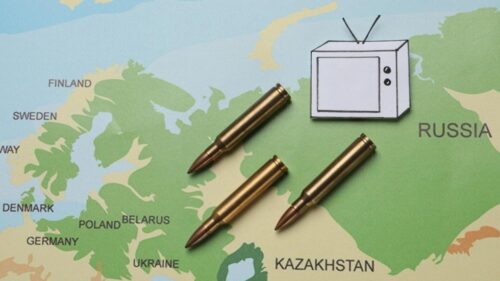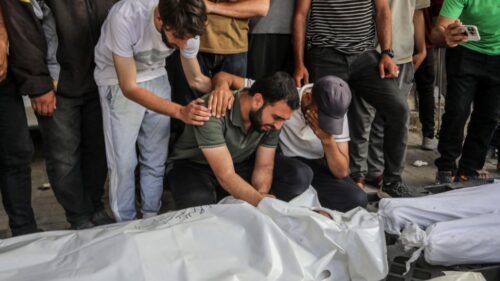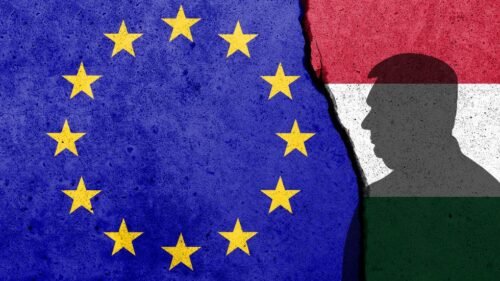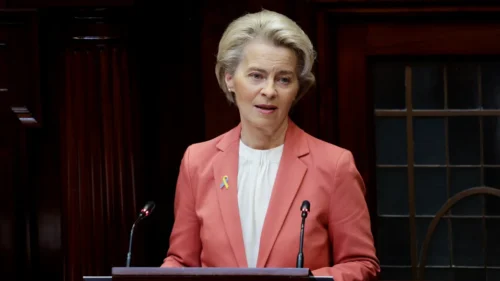Despite Commission President Ursula von der Leyen’s assertion that the EU is becoming a “geopolitical union,” Europe continuously fails to address current security issues. Efforts to deliver on the Commission’s pledge of “unwavering support for Ukraine” have been accompanied by fierce rhetoric but disappointing results.
The underlying problem is not a lack of resources, political will or popular support. Rather, it is the reluctance of EU member states to compromise on their national sovereignty, even for the sake of collective security. This has resulted in a system of unwieldy backroom compromises that risk not only defeat in Ukraine, but also the long-term security of the continent and the integrity of the European idea. To generate the power and independence needed to protect Europeans in this changing world order, Europe must gain statehood — strong and open institutions under the direct democratic control of European citizens.
The EU is failing to meet expectations
In the face of global turmoil, Europeans are increasingly looking to the EU for leadership, as recent polls show. Nation-states on their own no longer seem capable of protecting Europeans, who are surrounded by an increasingly hostile US, an aggressive China and an expansionist Russia committing acts of genocide on European soil. The EU, too, will fall short of securing lasting peace on the continent unless its institutions transform fundamentally.
The core of the problem is the Union’s governing structure, which — still built on sovereign nation states — obstructs common foreign policy initiatives and the mobilization of resources for defense. Despite cascading security crises, national fishing interests stalled progress on key defense agreements with the UK. Meanwhile, Hungary and Slovakia have repeatedly blocked sanctions against Russia, Georgia and Belarus.
To get anything done on security matters, the EU is forced to conclude quid pro quos with recalcitrant governments behind closed doors. These are lengthy processes, often leading to unstable solutions that threaten the legitimacy of the European idea.
Backroom pressure also projects an image of opaque, strong-arm politics. Recent proposals to make sanctions a matter of national policy — by bypassing EU institutions to avoid Hungary’s veto — challenge the very idea of a geopolitical union. As Lithuania’s Minister of Foreign Affairs Kęstutis Budrys bluntly put it: “What is the EU for then?”
Erosion of trust will have consequences
EU leaders must finally recognize that the creation of a more powerful “geopolitical commission” requires a concurrent expansion of democracy and transparency to achieve lasting support from Europeans. Brussels’ inability to address its democratic deficit threatens the EU’s legitimacy and risks a resurgence of anti-EU sentiment across the continent.
More and more citizens worry about their ability to shape affairs in Brussels. This sentiment is particularly salient amongst young Europeans. The trope “Brussels Dictatorship” has become a rallying cry at Eurosceptic gatherings across the continent. Concerns are also growing about the transparency of the European Commission’s conduct — particularly among journalists, who face increasing barriers in their requests for information.
The rise of anti-European and pro-Russian political parties across Europe could have dire consequences in a possible direct military confrontation with Russia. The Kremlin — steadily grinding westward in Ukraine — is now openly fantasizing that Poland and the Baltic states would be “the first to suffer” in such a scenario.
In addition, the US is becoming increasingly “fed up” with European efforts to support Ukraine and is likely to reduce its military presence on the continent. Add to this the potential future deployment of European forces on the ground in Ukraine, and a direct confrontation with Russia looks increasingly likely.
How will the EU respond if it does not have months to come up with workarounds to deal with vetoes from a potentially larger number of pro-Russian governments? Who will coordinate a military response if the US is out of the picture?
The uncertainty surrounding these questions projects weakness and is a provocation for acts of aggression by Europe’s adversaries. Failure to create a Europe capable of decisive action threatens not only the EU’s legitimacy but also the continent’s ability to deter an emboldened Russia.
Effective leadership requires a democratic European state
The uncomfortable but inescapable conclusion of Europe’s conundrum is as follows: for the continent to become a geopolitical actor, EU nation-states must relinquish control over key security and foreign policy issues to a European polity. Most Europeans support the goal of making Europe a stronger geopolitical power, but few realize that achieving this effectively renders their nations part of a larger European state. The consequences of such a shift would include the redundancy of most general staff and defense ministries, as well as a loss of independence in national foreign policy-making and military procurement.
The arguments of EU skeptics are not immune to this logic. The right wing’s critique of the European project is often based on the defense of national sovereignty. From former British Prime Minister Margaret Thatcher’s Bruges speech in 1988 to former leader of the French far-right National Rally Marine Le Pen and Prime Minister of Hungary Viktor Orbán today, conservative voices fear the erosion of national self-determination at the hands of Brussels and its so-called “technocrats” and “globalists.”
But even from this vantage point, going it alone as a European nation-state is a dead end. Maintaining de jure national self-determination creates little more than a mirage of true sovereignty. In practice, a disunited Europe would grow ever more exposed to the whims of the great powers. To use a pointed scenario: as individual nation-states — already incapable of protecting European interests in the Middle East — Europe would be forced to continue to sit on the sidelines while Russia, China and the US pursue their agendas, likely exposing the continent to further migration crises and regional instability.
A powerful European military capable of protecting Europeans requires a fully integrated European leadership and strategic planning. The same goes for a collective foreign policy, which can only be conducted with a European mandate. Similarly, building an effective European defense industrial complex requires a coherent strategy and unified decision-making: Ergo, the creation of a European state.
Continuing with the current model — marked by sluggish, opaque decision-making and fragile compromises — is inadequate to deal with the challenges facing Europe today. It disregards the interests of European citizens just to preserve the illusion of national sovereignty. Building a strong Europe has thus become indispensable for true self-determination and freedom from coercion by the great powers.
Any consolidation of power must go hand in hand with democratic renewal towards open institutions with the European people at the heart of decision-making — even if this initially leads to a smaller but stronger structure. Then, in the words of the late Tony Judt, “the twenty-first century might yet belong to Europe.” The alternative is the harsh reality of irrelevance: vassalage, unfreedom and potential destruction.
[Neue Zürcher Zeitung first published this piece.]
[Cheyenne Torres edited this piece.]
The views expressed in this article are the author’s own and do not necessarily reflect Fair Observer’s editorial policy.
Support Fair Observer
We rely on your support for our independence, diversity and quality.
For more than 10 years, Fair Observer has been free, fair and independent. No billionaire owns us, no advertisers control us. We are a reader-supported nonprofit. Unlike many other publications, we keep our content free for readers regardless of where they live or whether they can afford to pay. We have no paywalls and no ads.
In the post-truth era of fake news, echo chambers and filter bubbles, we publish a plurality of perspectives from around the world. Anyone can publish with us, but everyone goes through a rigorous editorial process. So, you get fact-checked, well-reasoned content instead of noise.
We publish 3,000+ voices from 90+ countries. We also conduct education and training programs
on subjects ranging from digital media and journalism to writing and critical thinking. This
doesn’t come cheap. Servers, editors, trainers and web developers cost
money.
Please consider supporting us on a regular basis as a recurring donor or a
sustaining member.
Will you support FO’s journalism?
We rely on your support for our independence, diversity and quality.









Comment